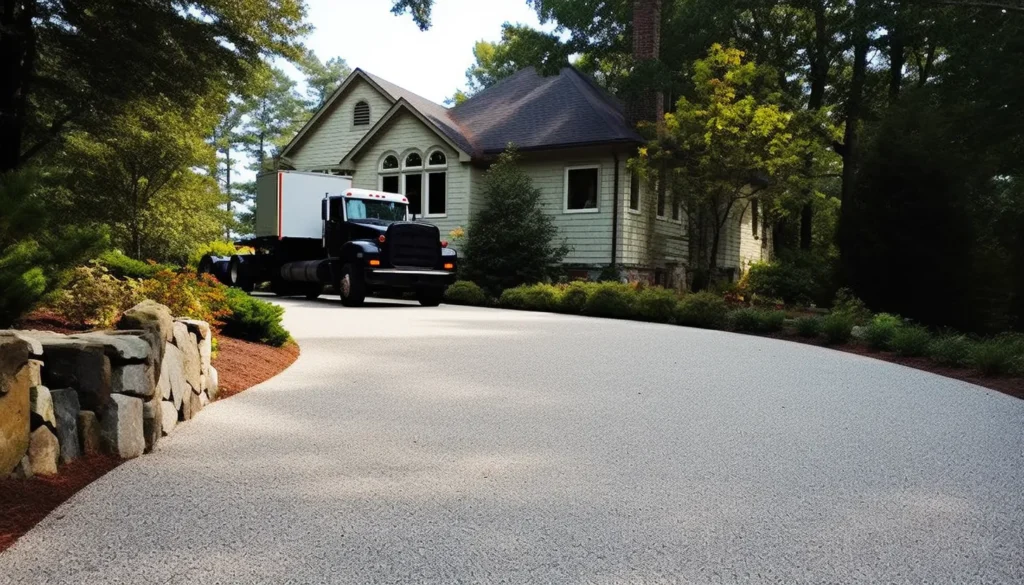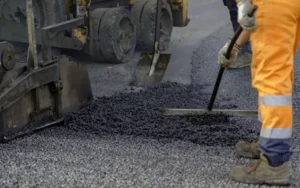You may be wondering what the difference is between tar and chip driveways and asphalt driveways. It’s important to know the difference between these two types of driveways in order to make an informed decision when it comes to building or repairing your driveway.
In this article, we’ll compare the cost, durability, maintenance requirements, and installation process of tar and chip driveways and asphalt driveways. We’ll also provide insight as to which type of driveway may be the right choice for you.
So, let’s dive in and explore the differences between tar and chip driveways and asphalt driveways.
Cost Comparison
Comparing the costs between tar and chip driveways and asphalt can help you determine the best option for your project.
Tar and chip driveways are typically cheaper than asphalt during the initial installation process. This is because tar and chip surfaces are easier to install and require fewer specialized materials and tools. However, asphalt is much more durable and requires less maintenance in the long run.
This means that asphalt will cost less to maintain in the long run compared to tar and chip driveways. Additionally, asphalt surfaces can be resealed and repaired fairly easily, whereas tar and chip driveways require more extensive and costly repairs. Therefore, depending on your budget, you can decide which material is best for your project.
Durability of Tar and Chip
You’re curious about the durability of a tar and chip surface? Let’s dive in and explore it together.
Tar and chip driveways are often cheaper to install and maintain than asphalt driveways, but they lack the durability of asphalt. They are known to be susceptible to damage and wear from weather and traffic, leading to a shorter lifespan than asphalt. Tar and chip driveways are more prone to cracking, potholes, and eroding edges over time. This makes them less suitable for driveways with heavy traffic and vehicle loads.
However, they can be effectively maintained with regular treatments of seal coating and chip sealing, which can extend the life of the driveway. It may be wise to use tar and chip driveways on driveways with lighter traffic and in climates with milder weather conditions.
Durability of Asphalt
Asphalt driveways are known for their durability, but have you ever wondered how much wear and tear they can handle? Asphalt is composed of a mix of stone, sand, and liquid asphalt, and is typically 4-6 inches thick. This helps asphalt to resist wear and tear from traffic, weather, and other environmental factors.
This protection can last 10-20 years under normal conditions. Asphalt also has high tensile strength, making it resistant to cracking and breaking due to heavy loads. Furthermore, asphalt is designed to be flexible, allowing it to expand and contract with temperature changes, which helps to prevent damage from extreme weather.
In short, asphalt is designed to be durable and long-lasting, making it a great choice for driveways.
Maintenance Requirements
Keeping asphalt driveways in good condition requires regular maintenance, so you’ll need to plan on ongoing efforts to keep your asphalt looking and performing its best. This may include applying sealcoats every 3-5 years, cleaning up spills and debris from the surface, filling cracks and potholes as soon as they start to appear, and repaving or resurfacing periodically.
The key to maintaining asphalt driveways is to be proactive in addressing small issues before they become bigger problems. The amount of maintenance required will depend on the type of traffic the driveway receives, the weather conditions, and the quality of the asphalt material used. To ensure your asphalt driveways last for years, it’s important to perform regular inspections and take corrective action when necessary.
Installation Process
Installing asphalt driveways can be a labor-intensive process, but it’s often worth the effort. On average, asphalt driveways have a lifespan of up to 20 years with minimal maintenance.
On the other hand, tar and chip driveways are significantly cheaper to install, but their lifespan is much shorter—typically 7-15 years. The installation process involves applying a layer of hot liquid asphalt, then covering it with a layer of crushed stone chips. The chips are pressed into the asphalt with a steamroller, then a sealcoat is applied to the surface to prevent the chips from becoming loose and worn.
This sealcoat must be reapplied every few years to keep the driveway in top condition. The installation process is also much faster than with asphalt, as the tar and chip driveway can be open for traffic within a day of installation.
Overall, tar and chip driveways are a great option for those on a tight budget, but the shorter lifespan and need for frequent maintenance make asphalt driveways a better long-term investment. Asphalt driveways are more durable, require less maintenance, and have a longer lifespan than tar and chip driveways.
For these reasons, asphalt is often the material of choice for many driveway-building projects.
Conclusion
When it comes to choosing between tar and chip driveways and asphalt driveways, there are a few things to consider. Firstly, tar and chip driveways are significantly cheaper to install, but they are less durable.
On the other hand, asphalt driveways are more expensive to install, but they last much longer. In addition, asphalt driveways require less maintenance.
For example, a case study conducted in the small town of Springfield revealed that the tar and chip driveways installed there deteriorated significantly after just 5 years, whereas the asphalt driveways in the neighboring town of Riverdale are still in excellent condition after 10 years.
Ultimately, depending on your budget and needs, you can choose between tar and chip and asphalt driveways.



